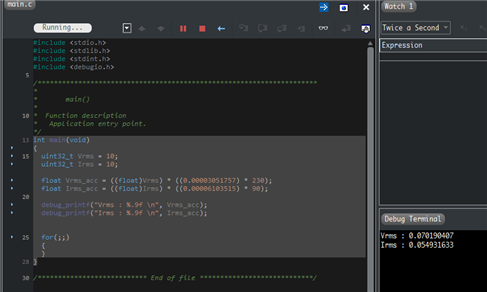Hi
I am reading the sensor data (Irms and Vrms) via I2C protocol and multiplying the read data with 0.000030517578125 to get correct result but i am getting the result as zero
Vrms = ((m_sample[1] << 8) | m_sample[0]);
Irms = ((m_sample[3] << 8) | m_sample[2]);
float Vrms_acc = ((float)Vrms) * (0.000030517578125);
float Irms_acc = ((float)Irms) * (0.00006103515625);
NRF_LOG_INFO("-------------------\r\n");
NRF_LOG_INFO(" Recevied Data.\r\n");
NRF_LOG_INFO(" Vrms = " NRF_LOG_FLOAT_MARKER "\r\n", NRF_LOG_FLOAT(Vrms_acc));
NRF_LOG_INFO(" Irms = " NRF_LOG_FLOAT_MARKER "\r\n", NRF_LOG_FLOAT(Irms_acc));
NRF_LOG_INFO("-------------------\r\n");
---------------------------------------------------------------------------------------------------------------------------
OUTPUT
ENERGY_METER:INFO:-------------------
ENERGY_METER:INFO: Recevied Data.
ENERGY_METER:INFO: Vrms = 0.000000000000000
ENERGY_METER:INFO: Irms = 0.000000000000000
ENERGY_METER:INFO:-------------------
Thanks in advance



